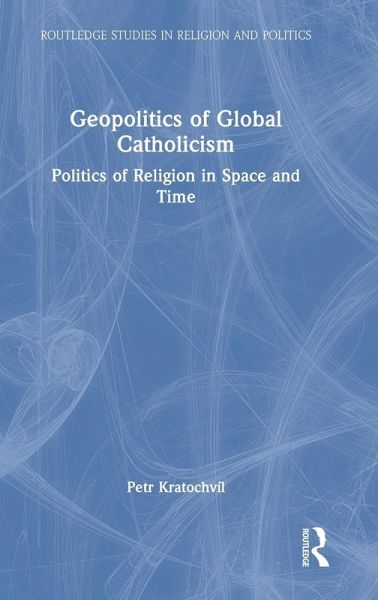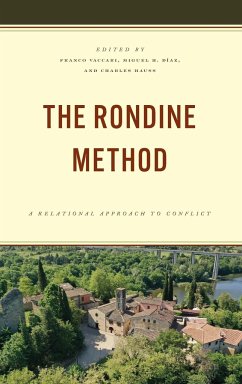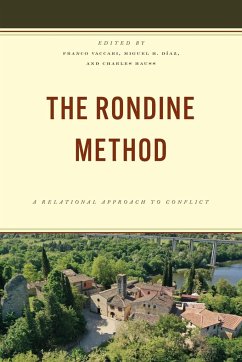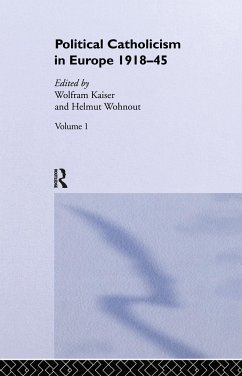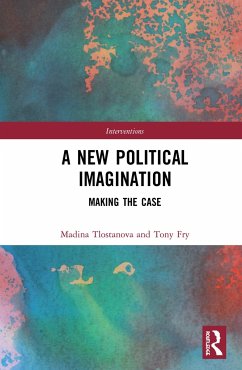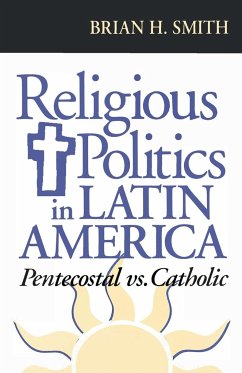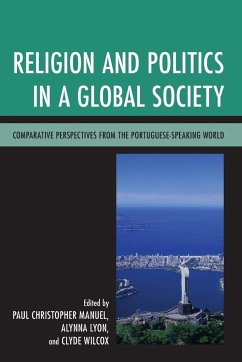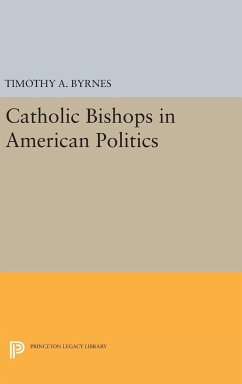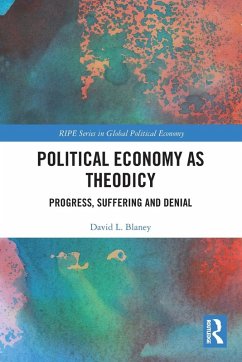Petr Kratochvíl
Gebundenes Buch
Geopolitics of Global Catholicism
Politics of Religion in Space and Time
Versandkostenfrei!
Versandfertig in 1-2 Wochen
Weitere Ausgaben:

PAYBACK Punkte
86 °P sammeln!





Geopolitics of Global Catholicism uncovers the key trends in today's Catholicism, including its deep entanglement with national, regional, as well as global politics, providing a comprehensive analysis.
Petr Kratochvíl is a full professor and a senior researcher at the Institute of International Relations in Prague, Czech Republic, and a lecturer at Sciences-Po in Paris, France, and Metropolitan University of Prague, Czech Republic (courses on international relations theories, research methods in international relations, geopolitics of religion, and religion and world politics). His main research interests include the religion-politics nexus, critical geopolitics, and theories of international relations. He has published extensively on religion and politics, particularly about the Catholic Church, including in top journals such as Geopolitics, Cooperation and Conflict, Politics and Religion, and many others. His most recent texts include his chapter on Catholicism and Europe in the Oxford Handbook of Religion and Politics and a series of academic studies about politics and religion in Central and Eastern Europe. His previous book (co-authored by Tomá Doleal) received the Distinguished Book Award of the REL Section of the American International Studies Association. His recent study titled The Patriotic Turn in Russia: Political Convergence of the Russian Orthodox Church and the State? (cöwritten with Gaziza Shakhanova) received the 2023 Ted Jelen Award for the best article on religion and politics, awarded by the American Political Science Association.
Produktdetails
- Verlag: Routledge
- Seitenzahl: 256
- Erscheinungstermin: 29. Mai 2024
- Englisch
- Abmessung: 240mm x 161mm x 18mm
- Gewicht: 552g
- ISBN-13: 9781032594637
- ISBN-10: 1032594632
- Artikelnr.: 70146095
Herstellerkennzeichnung
Libri GmbH
Europaallee 1
36244 Bad Hersfeld
gpsr@libri.de
"From a renowned expert of Christianity and international affairs comes a new and refreshing perspective on the geopolitics of the Catholic Church that is focused on the "south of the world". The story of Catholicism in the 21st century needed to be told and Petr Kratochvíl was brave enough to take the task on."
Luca Ozzano, University of Turin, Italy
"Petr Kratochvil's meticulously written new book critically examines our current understanding of Catholicism with such thoroughness and precision that it prompts deep questioning. This comprehensive study, which is open to challenging Eurocentric and exclusively institution-oriented perspectives, serves as both an exemplar in terms of the countries it
Luca Ozzano, University of Turin, Italy
"Petr Kratochvil's meticulously written new book critically examines our current understanding of Catholicism with such thoroughness and precision that it prompts deep questioning. This comprehensive study, which is open to challenging Eurocentric and exclusively institution-oriented perspectives, serves as both an exemplar in terms of the countries it
Mehr anzeigen
examines and a ground-breaking contribution to the field of religion-politics theories. Far from being solely intended for experts of social sciences, this book will also serve as a reference point for those interested in comprehending the roles of religion in both local and global politics."
Ahmet Erdi Öztürk, London Metropolitan University, UK
"This book is a very important contribution that helps us understand the transition of Catholicism from a globally extensive Church to a truly globalized Church. It is a phenomenon of enormous complexity, not only culturally and theologically, as it also has significant geopolitical implications. This analysis has the much-needed virtue of being free from a certain "global Catholic" exoticism which tends sometimes to look romantically at the idea of the replacement of the Western-European hegemony over the Church with one of the "global South". We have entered an age of diversification and encounter but also fragmentation."
Massimo Faggioli, Villanova University, USA
"Eschewing the grand narratives of Catholicism's culture warriors today, this book offers insights into the many faces of global Catholicism. Its case studies on Brazil, Congo, India, China, and the USA show how the character and significance of Catholicism are shaped by a greater longing to understand one's place in one's own context and culture - a longing that has often been accompanied by a struggle for liberation, authenticity, belonging, recognition, and power. Taken together, the case studies command the reader to examine the relationship between religion, politics, and International Relations beyond the classic frames of "religion vs secularism", "traditionalists vs progressivists", and "left vs right". What is more, the book shows that the future of Catholicism is not in the hands of some high-profile culture warriors, but in the hands of a tradition seasoned in finding its place amidst the challenges and contradictions of each time period."
Marietta van der Tol, University of Oxford, UK
"This book, in the tradition of multiple modernities, argues that space and time are important in the geopolitics of Catholicism. Petr Kratochvíl demonstrates that despite the formally hierarchical and unitary structure of the Catholic Church, in practice, different regional and theological ideations within Catholicism's diverse and vibrant world community create a multiplicity of localized geopolitical agendas across world Catholicism. While these diverse theologies are all linked to a single temporality, their diversity explains the change and evolution in the Catholic Church. I find the insight that large, world-spanning religions cannot be anything other than diverse over time and space key to understanding not only the geopolitics of Catholicism, but the evolving role religions such as Christianity's multiple denominations, Islam, Judaism, Buddhism, and Hinduism play in world politics."
Jonathan Fox, Bar-Ilan University, Israel
"Geopolitics of Global Catholicism: Politics of Religion in Space and Time by Petr Kratochvíl is a pivotal work that extends the boundaries of geopolitical analysis within the realm of global Catholicism. With its rigorous approach to intertwining spatial and temporal dimensions through the novel concept of "geopolitical theoscape," this book offers a profound reevaluation of religious geopolitics. It is an essential read for scholars and practitioners interested in the intersections of religion, politics, and global dynamics. It promises not only to inform but also to inspire further research in the geopolitics of religion."
Jocelyne Cesari, University of Birmingham, UK, and Georgetown University, USA
"This book offers a comprehensive analysis of the Catholic Church's transformative trajectory as it shifts from a historically Eurocentric institution to one embracing global diversity, with a particular focus on its expansion in the Southern Hemisphere. It addresses the challenges faced by the Church in reconciling its past, addressing contemporary global issues, and managing internal diversity and potential fragmentation. This manuscript stands out for its elegant prose, empirical depth, and innovative methodology. The book explains the paradox of how the Church, one of the Western world's most historically significant institutions, is actively redefining its identity to distance itself from Western influences. It is designed for scholars, religious leaders, and anyone interested in the future of global religious institutions, and it provides critical insights into the geopolitical reorientation of Catholicism today."
Tornike Metreveli, Lund University, Sweden
"From Brazil through China, the United States, and India to the Democratic Republic of Congo, this book presents an innovative, theoretically-rich and thought-provoking study of Catholic geopolitics. The paths of non-European Catholicism presented in the book diverge into particular theoscapes where global religion interacts with local politics and culture. The book is an essential read for those interested in the geopolitics of religion in contemporary times and the spatial and temporal political configurations they encapsulate. As Kratochvíl aptly demonstrates, neither our political spatiality nor our political temporality is fixed."
Guy Ben-Porat, Ben-Gurion University, Israel
"Combining religious studies with geopolitics, and high-level concepts with detailed empirics, this book provides an expansive assessment of the state of global Catholicism and why it matters. Kratochvíl moves discussions of Catholicism and world politics beyond the Vatican, highlighting the numerous ways it is expressed in differing cultural contexts. This book will serve as the foundation for future studies on global Catholicism, while offering a framework for studying the global politics of other religious traditions."
Peter S. Henne, University of Vermont, USA
"Kratochvíl's exciting study shifts the focus away from the conventional, top-down structures of Catholicism, offering a vibrant, grassroots geopolitical lens through which to view global Catholicism. His introduction of "theospaces," anchored in familial, local, and narrative dimensions, presents a compelling analytical framework, reimagining religion as a complex and serious geopolitical tapestry. Against the backdrop of the declining influence of church hierarchies on a global scale, Kratochvíl's book stands as a timely and indispensable geopolitical contribution, shedding new light on a long-overlooked aspect of contemporary global Catholicism."
Katharina Kunter, University of Helsinki, Finland
"This is a welcome contribution to the study of Catholicism today, strong in its theoretical claims and highly suggestive in its empirical demonstration. Arguing for a distinction between the Catholic Church and Catholicism makes a lot of sense in the South, were it not also the case in the older strongholds of Western Christianity. On the other hand, the coextensiveness of time and space beyond the privilege of space over time in Western thought and time over space in religious narratives and theological discourse, can shed much-needed light on how Catholicism evolves and strives to respond to current trends by becoming even more glocal the farther it goes beyond its European centres. There are certainly issues to be faced as one delves into Kratochvíl's local explorations of the political implications of his church/culture distinction, but the direction of travel is timely and promising."
Joanildo A. Burity, Joaquim Nabuco Foundation, Brazil
"The social and political role of Catholicism around the globe is comparatively one of the less understood and more misinterpreted ones among all the great worldwide religions. By immersing the reader in the rich past and more recent histories of five non-European Catholic worlds, Kratochvíl's Geopolitics of Global Catholicism dismantles some of the idées reçues on the global political influence of the Catholic world. The paradox of its unique institutional mix of locality and universality, tradition and reform, centralised hierarchies and lived decentralised realities becomes more intelligible. Catholicism is finally geopolitically revealed as a sort of coincidentia oppositorum driven by its well-known motto ecclesia semper reformanda est."
Fabio Petito, University of Sussex, UK
"In this ground-breaking book based on empirical research in five different countries on three different continents, Petr Kratochvíl introduces the concept of geopolitical theoscapes to capture the different instantiations of global Catholicism. In doing so, he questions the dominant narrative of Catholicism as the archetypal European religion and the Catholic Church as a Eurocentric, hierarchical, top-down institution."
Giorgio Shani, International Christian University Tokyo, Japan
"The argument of the global dimension of the Catholic Church has been extensively used to limit theological and pastoral innovation by the magisterium, to overcome the Eurocentric self-consciousness and to detach the church from particular political agendas. Petr Kratochvíl deconstructs all these ideas with an eye-opening and fresh analysis of the intersections and contestations within the Catholic globe. With five case studies, which are more than unconventional in their combination and therefore extremely informative, the author exemplifies the limits of the North-South narrative as well as the ambiguities and simultaneities in theological, pastoral and sociopolitical developments in all parts of the Catholic world. The book recommends itself as a required reading for the participants of the Bishop's Synod in Rome with its aim to bring global Catholicism into the 21st century, as well as for everyone interested in the broader picture of Catholic (geo)political entanglement."
Regina Elsner, University of Münster, Germany
Ahmet Erdi Öztürk, London Metropolitan University, UK
"This book is a very important contribution that helps us understand the transition of Catholicism from a globally extensive Church to a truly globalized Church. It is a phenomenon of enormous complexity, not only culturally and theologically, as it also has significant geopolitical implications. This analysis has the much-needed virtue of being free from a certain "global Catholic" exoticism which tends sometimes to look romantically at the idea of the replacement of the Western-European hegemony over the Church with one of the "global South". We have entered an age of diversification and encounter but also fragmentation."
Massimo Faggioli, Villanova University, USA
"Eschewing the grand narratives of Catholicism's culture warriors today, this book offers insights into the many faces of global Catholicism. Its case studies on Brazil, Congo, India, China, and the USA show how the character and significance of Catholicism are shaped by a greater longing to understand one's place in one's own context and culture - a longing that has often been accompanied by a struggle for liberation, authenticity, belonging, recognition, and power. Taken together, the case studies command the reader to examine the relationship between religion, politics, and International Relations beyond the classic frames of "religion vs secularism", "traditionalists vs progressivists", and "left vs right". What is more, the book shows that the future of Catholicism is not in the hands of some high-profile culture warriors, but in the hands of a tradition seasoned in finding its place amidst the challenges and contradictions of each time period."
Marietta van der Tol, University of Oxford, UK
"This book, in the tradition of multiple modernities, argues that space and time are important in the geopolitics of Catholicism. Petr Kratochvíl demonstrates that despite the formally hierarchical and unitary structure of the Catholic Church, in practice, different regional and theological ideations within Catholicism's diverse and vibrant world community create a multiplicity of localized geopolitical agendas across world Catholicism. While these diverse theologies are all linked to a single temporality, their diversity explains the change and evolution in the Catholic Church. I find the insight that large, world-spanning religions cannot be anything other than diverse over time and space key to understanding not only the geopolitics of Catholicism, but the evolving role religions such as Christianity's multiple denominations, Islam, Judaism, Buddhism, and Hinduism play in world politics."
Jonathan Fox, Bar-Ilan University, Israel
"Geopolitics of Global Catholicism: Politics of Religion in Space and Time by Petr Kratochvíl is a pivotal work that extends the boundaries of geopolitical analysis within the realm of global Catholicism. With its rigorous approach to intertwining spatial and temporal dimensions through the novel concept of "geopolitical theoscape," this book offers a profound reevaluation of religious geopolitics. It is an essential read for scholars and practitioners interested in the intersections of religion, politics, and global dynamics. It promises not only to inform but also to inspire further research in the geopolitics of religion."
Jocelyne Cesari, University of Birmingham, UK, and Georgetown University, USA
"This book offers a comprehensive analysis of the Catholic Church's transformative trajectory as it shifts from a historically Eurocentric institution to one embracing global diversity, with a particular focus on its expansion in the Southern Hemisphere. It addresses the challenges faced by the Church in reconciling its past, addressing contemporary global issues, and managing internal diversity and potential fragmentation. This manuscript stands out for its elegant prose, empirical depth, and innovative methodology. The book explains the paradox of how the Church, one of the Western world's most historically significant institutions, is actively redefining its identity to distance itself from Western influences. It is designed for scholars, religious leaders, and anyone interested in the future of global religious institutions, and it provides critical insights into the geopolitical reorientation of Catholicism today."
Tornike Metreveli, Lund University, Sweden
"From Brazil through China, the United States, and India to the Democratic Republic of Congo, this book presents an innovative, theoretically-rich and thought-provoking study of Catholic geopolitics. The paths of non-European Catholicism presented in the book diverge into particular theoscapes where global religion interacts with local politics and culture. The book is an essential read for those interested in the geopolitics of religion in contemporary times and the spatial and temporal political configurations they encapsulate. As Kratochvíl aptly demonstrates, neither our political spatiality nor our political temporality is fixed."
Guy Ben-Porat, Ben-Gurion University, Israel
"Combining religious studies with geopolitics, and high-level concepts with detailed empirics, this book provides an expansive assessment of the state of global Catholicism and why it matters. Kratochvíl moves discussions of Catholicism and world politics beyond the Vatican, highlighting the numerous ways it is expressed in differing cultural contexts. This book will serve as the foundation for future studies on global Catholicism, while offering a framework for studying the global politics of other religious traditions."
Peter S. Henne, University of Vermont, USA
"Kratochvíl's exciting study shifts the focus away from the conventional, top-down structures of Catholicism, offering a vibrant, grassroots geopolitical lens through which to view global Catholicism. His introduction of "theospaces," anchored in familial, local, and narrative dimensions, presents a compelling analytical framework, reimagining religion as a complex and serious geopolitical tapestry. Against the backdrop of the declining influence of church hierarchies on a global scale, Kratochvíl's book stands as a timely and indispensable geopolitical contribution, shedding new light on a long-overlooked aspect of contemporary global Catholicism."
Katharina Kunter, University of Helsinki, Finland
"This is a welcome contribution to the study of Catholicism today, strong in its theoretical claims and highly suggestive in its empirical demonstration. Arguing for a distinction between the Catholic Church and Catholicism makes a lot of sense in the South, were it not also the case in the older strongholds of Western Christianity. On the other hand, the coextensiveness of time and space beyond the privilege of space over time in Western thought and time over space in religious narratives and theological discourse, can shed much-needed light on how Catholicism evolves and strives to respond to current trends by becoming even more glocal the farther it goes beyond its European centres. There are certainly issues to be faced as one delves into Kratochvíl's local explorations of the political implications of his church/culture distinction, but the direction of travel is timely and promising."
Joanildo A. Burity, Joaquim Nabuco Foundation, Brazil
"The social and political role of Catholicism around the globe is comparatively one of the less understood and more misinterpreted ones among all the great worldwide religions. By immersing the reader in the rich past and more recent histories of five non-European Catholic worlds, Kratochvíl's Geopolitics of Global Catholicism dismantles some of the idées reçues on the global political influence of the Catholic world. The paradox of its unique institutional mix of locality and universality, tradition and reform, centralised hierarchies and lived decentralised realities becomes more intelligible. Catholicism is finally geopolitically revealed as a sort of coincidentia oppositorum driven by its well-known motto ecclesia semper reformanda est."
Fabio Petito, University of Sussex, UK
"In this ground-breaking book based on empirical research in five different countries on three different continents, Petr Kratochvíl introduces the concept of geopolitical theoscapes to capture the different instantiations of global Catholicism. In doing so, he questions the dominant narrative of Catholicism as the archetypal European religion and the Catholic Church as a Eurocentric, hierarchical, top-down institution."
Giorgio Shani, International Christian University Tokyo, Japan
"The argument of the global dimension of the Catholic Church has been extensively used to limit theological and pastoral innovation by the magisterium, to overcome the Eurocentric self-consciousness and to detach the church from particular political agendas. Petr Kratochvíl deconstructs all these ideas with an eye-opening and fresh analysis of the intersections and contestations within the Catholic globe. With five case studies, which are more than unconventional in their combination and therefore extremely informative, the author exemplifies the limits of the North-South narrative as well as the ambiguities and simultaneities in theological, pastoral and sociopolitical developments in all parts of the Catholic world. The book recommends itself as a required reading for the participants of the Bishop's Synod in Rome with its aim to bring global Catholicism into the 21st century, as well as for everyone interested in the broader picture of Catholic (geo)political entanglement."
Regina Elsner, University of Münster, Germany
Schließen
Für dieses Produkt wurde noch keine Bewertung abgegeben. Wir würden uns sehr freuen, wenn du die erste Bewertung schreibst!
Eine Bewertung schreiben
Eine Bewertung schreiben
Andere Kunden interessierten sich für




